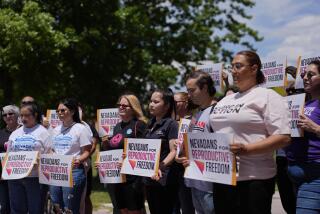Gays Weigh Alternatives to Boycott : Rights: Another freeze-out of Colorado seems to lack support among hard-hit business owners. Other ways of fighting Amendment 2 touted if top court backs it.
- Share via
DENVER — No sooner was Amendment 2, the anti-gay-rights measure, approved by Colorado voters in November, 1992, than a national boycott of the state caromed from Hollywood to Washington. It became politically correct to ski in Utah, Idaho and the High Sierra.
Facing a drop in the state’s $5-billion-a-year tourism industry, business and political leaders tried to counter the snowballing movement with desperate public pleas decrying the reaction as harmful to everyone’s interests, including gay men and lesbians.
Still, the nation’s largest gay-rights organizations and human-rights groups joined the boycott aimed at overturning the measure that bans state and local discrimination protections for homosexuals. Nine major cities, including New York, Atlanta and San Francisco, barred their government employees from travel to Colorado on official business. Entertainers Barbra Streisand and Whoopi Goldberg urged fellow celebrities to freeze out the “hate state.”
By the time the boycott was called off two years later, pending the outcome of court challenges that halted the law’s enactment, the movement had cost Denver alone $38 million in canceled conventions and left Coloradans divided and angry.
But the ultimate financial impact of the boycott is debatable. Some groups booked meetings in Denver to take the place of those that had canceled. And the boycott failed to put a dent in the state’s $340-million-a-year ski industry, which enjoyed record snows in 1992.
Lengthy court challenges to the amendment have provided breathing space among activists on both sides of the issue and time to reconsider the strategy.
As country songs flowed recently from the jukebox in Denver’s largest gay bar, Charlie’s, owner Wayne Jakino said one thing is clear: “A boycott is a two-edged sword.
“It kept the issue alive in the national media for months, which was good,” said Jakino, 53, who has owned the downtown bar for 11 years. “But the gay bar business in Denver was down 20% while the boycott was in full swing.”
In some cases, Jakino said, even regular patrons were afraid to congregate in businesses with a gay label.
No wonder.
Incidents of gay-bashing, from yelled obscenities to telephoned bomb threats, escalated for weeks after Amendment 2 passed.
Beyond that, he said, the boycott was largely promoted by groups from outside the state who failed to consult with local gay business owners and residents before urging tourists--including gay travelers--to stay away from Colorado.
Now the U.S. Supreme Court is preparing to consider the constitutionality of the law that would repeal existing protections for gay men and lesbians from discrimination in Denver, Boulder and Aspen. And Jakino has vowed to “discourage any such thing [as a boycott] if there is an adverse ruling.”
“I believe more is achieved through visibility and positive support of the community in which you live than through absence,” he said.
Jakino is not alone. Only the hottest heads believe that another boycott is a good idea. Most gay leaders here and across the nation are taking a wait-and-see attitude while casting a wary eye toward the high court’s conservative bent.
“There are those who will want a boycott,” said Frank Whitworth, executive director of Ground Zero, a gay-rights group in Colorado Springs, where the drive to get Amendment 2 on the state ballot was born. “But alternatives could include a national gay summit meeting in Colorado Springs, marches, acts of nonviolent civil disobedience, a move to repeal the amendment, even a ‘gaycott’ that would flood the state with gays and lesbians.”
David M. Smith, a spokesman for the Washington-based Human Rights Campaign Fund, the nation’s largest gay and lesbian political organization, said his group also has second thoughts about a boycott, which it supported in 1992.
“Although the boycott achieved its objective by rallying the country and communicating what happened,” Smith said, “it hurt some businesses in the city that were pro-gay and created a negative image of the state.
“If there is a negative ruling by the U.S. Supreme Court, we should organize to defeat these initiatives at the ballot box and use such a decision to further communicate the reality that gays do not have equal rights in this country. It will be a setback, but the movement will go forward.”
That view resonates among gay business owners throughout Colorado, many of whom lost revenues during the boycott.
Among them is Jim Bahrenberg, 56, owner of the tiny Basic Bed and Breakfast in Denver. “I was philosophically in favor of the boycott in 1992, but once it ran its course, I had to rethink it.”
Now, Bahrenberg said he believes that “whatever the Supreme Court decides, the best thing we could do is have an education blitz against discrimination, which is, after all, the result of fear and ignorance.”
In fact, most voters in Denver, Boulder and Aspen rejected the measure. The majority of votes in favor of the amendment came from rural communities across the state, as well as Colorado Springs, a bastion of conservative evangelical Christian groups.
But Phil Lobel, former head of the now-defunct Coloradans and Californians for Fairness in the Nation, which was formed to undo Amendment 2 through economic pressure, said it is too early to rule out another effort to avoid Colorado travel and products.
“It’s impossible to gauge the human emotion that comes from people’s hearts and souls,” said Lobel, who owns a Beverly Hills public relations firm, “until an adverse ruling is staring them in the face.”
More to Read
Sign up for Essential California
The most important California stories and recommendations in your inbox every morning.
You may occasionally receive promotional content from the Los Angeles Times.














